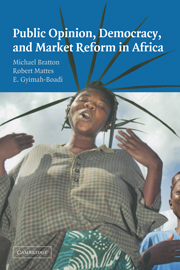Book contents
- Frontmatter
- Contents
- List of Tables and Figures
- Acknowledgments
- Introduction
- PART I FRAMEWORK
- PART II POPULAR ATTITUDES TO REFORM
- PART III COMPETING EXPLANATIONS
- PART IV EXPLAINING REFORM CONSTITUENCIES
- Conclusions
- Appendices
- A Items, Constructs, and Indices
- B Sampling Method
- C Imputation of Data
- Notes
- Index
- Cambridge Studies in Comparative Politics
B - Sampling Method
Published online by Cambridge University Press: 15 December 2009
- Frontmatter
- Contents
- List of Tables and Figures
- Acknowledgments
- Introduction
- PART I FRAMEWORK
- PART II POPULAR ATTITUDES TO REFORM
- PART III COMPETING EXPLANATIONS
- PART IV EXPLAINING REFORM CONSTITUENCIES
- Conclusions
- Appendices
- A Items, Constructs, and Indices
- B Sampling Method
- C Imputation of Data
- Notes
- Index
- Cambridge Studies in Comparative Politics
Summary
SAMPLING METHOD
Afrobarometer surveys are based on national probability samples representing cross sections of adult citizens in each country. The goal is to give every individual an equal chance of inclusion in the sample via random selection at every stage.
In six countries, a sample of 1,200 individuals allows inferences to national adult populations with a margin of error of no more than plus or minus 2.8 percent with a confidence level of 95 percent. When the sample size is increased to at least 2,000 (in five countries), the confidence interval shrinks to plus or minus 2.2 percent and to 1.6 percent for a sample of 3,600 (in Nigeria).
The sample universe includes all citizens of voting age. Excluded are noncitizens and anyone under the age of eighteen years on the day of the survey. Also left out are people living in institutionalized settings, such as prisons, student dormitories, and hospitals. We also exclude inaccessible areas, such as zones of armed conflict or natural disaster, as well as national parks and game reserves.
The design is a clustered, stratified, multistage, area probability sample. Geographic sampling units of decreasing size are selected in four stages:
Stage One: Selecting Primary Sampling Units (PSUs)
PSU's are the smallest, well-defined areas for which reliable population data are available. Since the Afrobarometer employs the most recent official national census as a sampling frame, PSUs are commonly census enumeration areas.
- Type
- Chapter
- Information
- Public Opinion, Democracy, and Market Reform in Africa , pp. 392 - 396Publisher: Cambridge University PressPrint publication year: 2004



